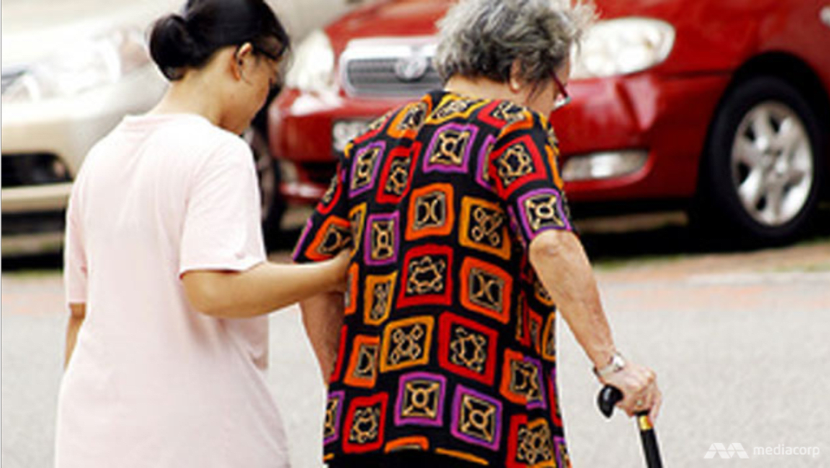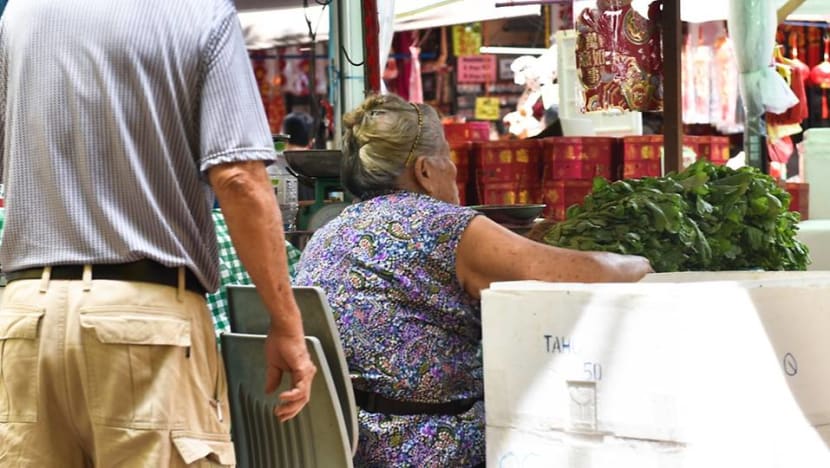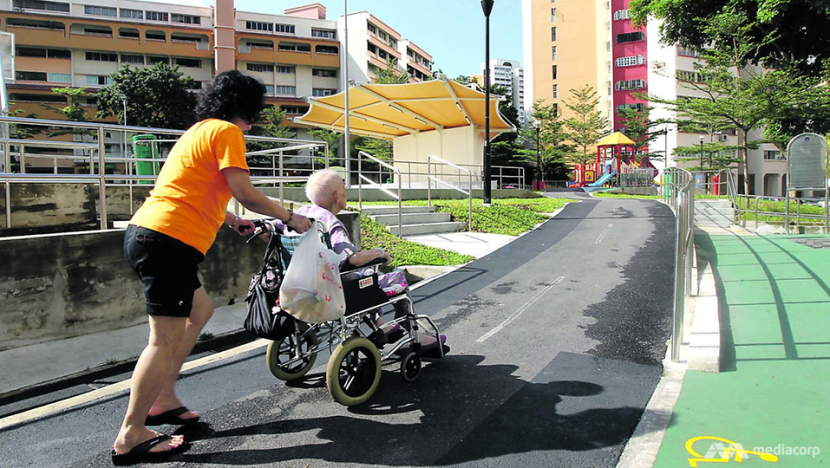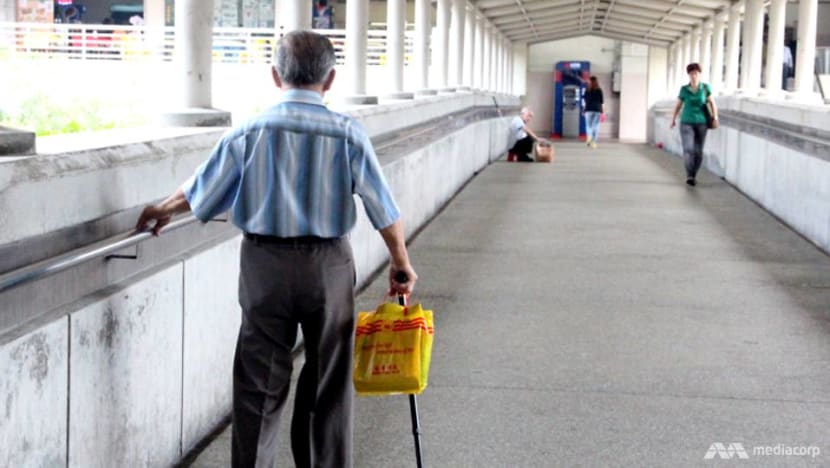commentary Commentary
Commentary: The role reversal between parent and child, as ageing takes a toll on families
Sometimes what our parents need most in their old age is for us to stop and listen, be patient and show them love them with our actions, says recipient of Nanyang Confucian Association’s Filial Piety Award Tan Chin Hock.

An elderly woman is being helped while walking on the road. (Photo: TODAY)
SINGAPORE: Mum’s memory has been failing.
She had left a pair of huge tailor’s scissors on the table but insisted she had kept it out of the children’s reach. A couple weeks ago, she left her cooking unattended and went out of the house to open the letter box.
What seemed like the hundredth argument my wife and I had since we moved my 74-year-old father and 65-year-old mum in with us eight years ago has become a daily affair.
They were getting on in age. Mobility was an issue due to mum’s severe osteoarthritis and dad was getting weaker as he aged.
I had moved them in to look after them better. But that decision strained our relationship with my parents and nearly broke my marriage.
A REALITY FOR MANY SINGAPOREANS
Ageing is a huge challenge for many Singapore families. Statistics from the Ministry of Social and Family Development show that the number of households with at least one senior has almost doubled from 2000 to 2014 from 192,800 to 354,700.
The conundrum of our rapidly ageing population is compounded when you think about how the number of seniors is projected to nearly triple to 900,000 by 2030. Looking after at least one if not two elderly parents will become a reality for many Singapore families.
While many seniors want to slow down and enjoy their golden years, ageing can be a costly affair for their families, especially if a senior is plagued with serious health issues or debilitating diseases for a prolonged period.
The Government recognises this and has rolled out a slew of policies and various support schemes to relieve the financial burden on families in recent years. These broad-based initiatives provide greater assistance to those in the lower income brackets, and cover a wide variety of costly essential services including healthcare, housing and social services.

LISTEN: What life in your 60s should look like, an episode on The Pulse podcast
The Pioneer Generation Package (PGP) and the Merdeka Generation Package, details of the latter which were announced at Budget 2019, benefit families with qualifying elderly parents, with outpatient care subsidies, Medisave top-ups, and Medishield Life subsidies among other aids to help defray healthcare costs.
Seniors in the bottom 20 per cent also receive assistance of at least S$300 a quarter from the Silver Support Scheme. The auto-inclusion feature of these schemes reduces administration hassle and ensures prompt financial assistance to seniors.
My family has benefited from these Government schemes. It might seem like small amounts, but these add up and have reduced our cash outlay over the years by no mean sum.
Last January, mum needed a knee replacement surgery, which came up to S$50 after subsidies. My dad’s cataract removal operation in 2011 cost less than S$100, with the rest paid for with Medisave and Medishield Life.
HEART WRENCHING
While financing healthcare is a challenge that has been recognised and tackled, what has received less focus and is often overlooked are the human aspects of caring for seniors.
Looking after the elderly is a familial responsibility that can be physically and emotionally draining for family members. This is especially when many caregivers are not aware of how extensive their role can be as a nurse, personal assistant and someone who handles the finances, Mr Kelvin Lim, chief of Senior Support and Carer Services Development Division at the Agency for Integrated Care, once said.

READ: Help with disability costs welcomed but allowing withdrawal of Medisave may not benefit all, a commentary
Families caring for seniors with multiple needs face an especially grueling challenge. Forty to 60 per cent of caregivers looking after loved ones with dementia suffer from “significant stress”, according to a 2016 study conducted by Tan Tock Seng Hospital’s Institute of Geriatrics and Active Ageing. If left unattended, the more serious cases can degenerate into depression.
This is a challenge I understand, as my mum suffered a bout of mental illness when I was in my early twenties. She also suffered from severe osteoarthritis and has been wheelchair-bound for the past decade.
READ: Dementia caregivers put on a brave front – while watching loved ones fade away, a commentary
Her physical condition has exerted a mental and emotional toll on our family. She would hurl expletives at us whenever she felt frustrated or when the pain in her knees became unbearable.
WHAT DOES BEING FILIAL MEAN?
It is in this context that caring requires families to go the extra mile to provide assurance for seniors and confidence to face an uncertain future in old age.
When people ask what drove me to move my parents in with us, I reply that filial piety does it for me. Everybody's view on filial piety is different but I see it as more than just providing financial support for our parents, but also unconditional love, taking care of all their needs in their old age.
Isn't it innate to love our parents? Yes, but in the midst of competition for our limited time and attention, bogged down with making ends meet, and when old age causes physical pain and strains relations, it is very challenging to love them in the way they need to be loved.
Instead, we tend to get angry and frustrated with our parents over the slightest thing. How many times have we ignored our parents when they asked about our day, dismissing their concerns as nagging?
How often do we grow impatient and show our annoyance at them when they are forgetful? How frequently do we treat strangers better than our parents?
And as they age, do we realise that they need us to show them the same love and understanding they showed us while we were helpless children?

READ: Three lessons learned caring for seniors as Singapore's population ages, a commentary
Instead, most of us take them for granted and think our relationship with our parents can continue like business as usual during their twilight years.
Most of us do not understand how to adapt to this inevitable yet painful role reversal between aged parents and middle-aged child. Many of us find it challenging to even identify let alone meet these new commitments to our elderly parents.
Sandwiched between the old and our young children, we find ourselves unprepared for the financial, physical and psycho-somatic requirements that come with caring for aged parents.
What has helped in caring for my parents in their old age and coping with this role reversal was becoming a parent myself and extending my empathy to them.
Every parent wishes for their children to be independent, look after themselves, and earn an honest living. Every parent hopes for their child to reciprocate their parental love, especially in their later years, as they age and slowly fade away with each passing day.
So while aid to help tackle rising healthcare costs through the Merdeka Generation Package in this Budget is appreciated, I hope Singaporeans see that caring for their aged parents will require more than just dollars and cents.
READ: Merdeka Generation Package - What you need to know
Sometimes what is needed are not big sweeping gestures but the small things like spending time with them, visiting them with their favourite food if they live elsewhere, or accompanying them for medical appointments to provide assurance.
At the core of these small gestures is a respect for their wishes and an empathetic heart to give back to them in the way they cared for us while we were young.
It does not take a lot actually, it just requires a re-prioritisation of our time and a mindset shift.
Tan Chin Hock is recipient of the filial piety award conferred by the Nanyang Confucian Association.












